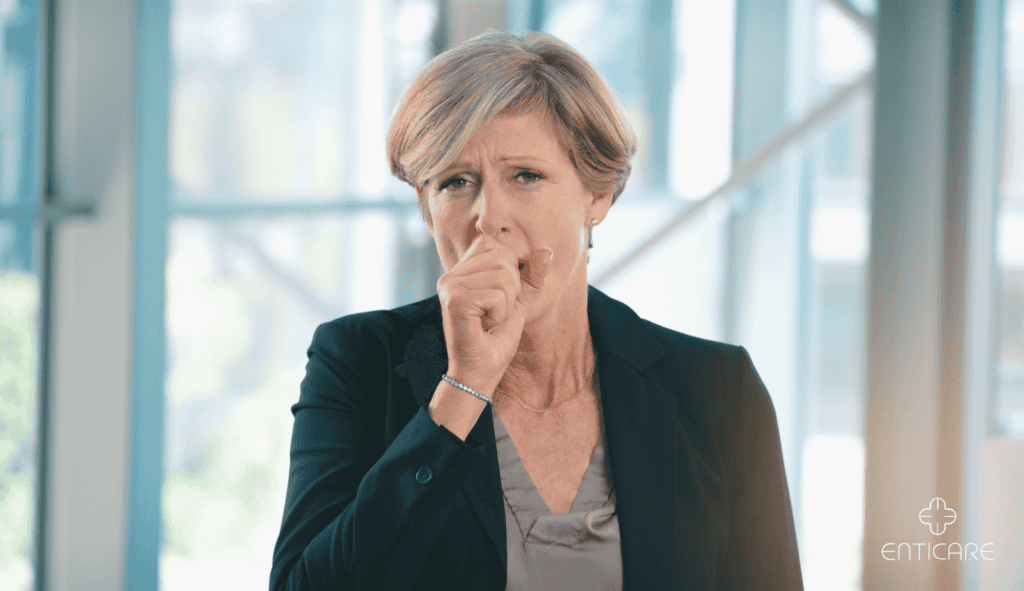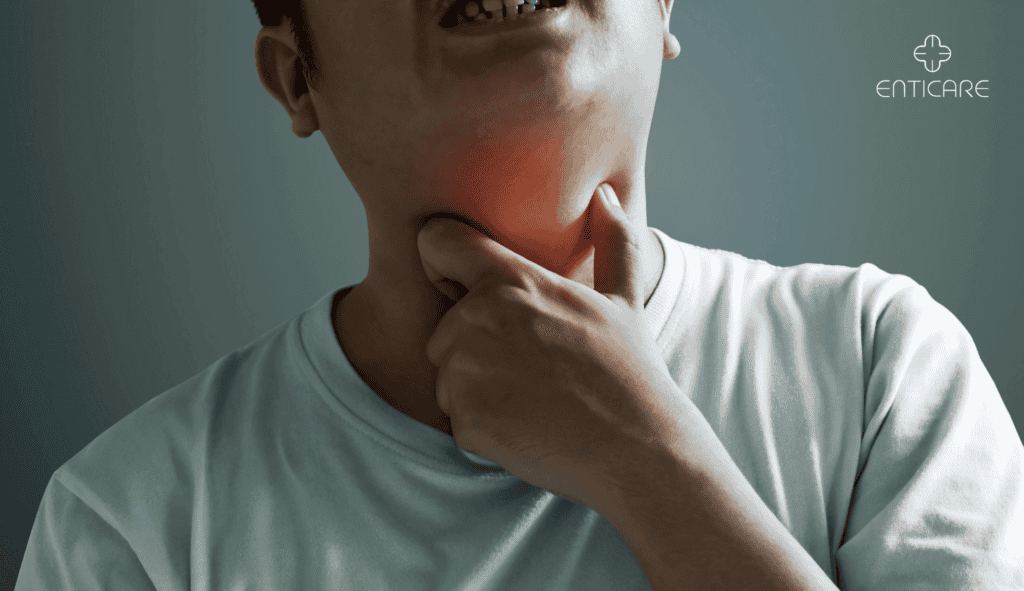An itchy throat can disrupt your day with irritation, coughing, and the urge to scratch internally. Although common, a scratchy throat often stems from various causes, each needing a different solution. Let’s uncover what causes that persistent itch and what you can do to relieve it.

Common Causes of an Itchy Throat
Identifying why your throat itches can be the first step toward effective relief. Here are some frequent causes of this discomfort:
-
- Allergic Reaction: Allergens like pollen, pet dander, and certain medications can trigger an itchy throat. Symptoms may include itchy or watery eyes and throat discomfort, distinguishing these reactions from other causes.
- Bacterial Infection: Severe sore throats can indicate a bacterial infection, such as strep throat. Symptoms may escalate, and seeking medical advice for possible antibiotic treatment is important to differentiate from viral infections.
- Food Allergies: Certain foods can trigger allergic reactions, leading to an itchy throat. These reactions are often associated with other allergies, such as pollen, and can cause inflammatory responses.
- Gastroesophageal Reflux Disease: GERD can cause stomach acid to back up into the esophagus, leading to throat irritation, heartburn, and chest pain. Treatment options include antacids and dietary recommendations.
Seasonal Allergies
-
- Pollen: Seasonal pollen, especially from trees, grasses, and weeds, can irritate your throat, often in spring and fall.
- Dust and Mold: Dust mites and mold spores are indoor allergens that can worsen symptoms throughout the year.
- Pet Dander: Even pets can trigger throat irritation, especially those allergic to dander from animals like cats and dogs.
- Allergic Rhinitis: A common allergic condition triggered by allergens such as pollen and dander, leading to symptoms like an itchy throat. It is prevalent among individuals experiencing seasonal allergies.
- Allergy Symptoms: An itchy throat, sneezing, and a runny nose manifest in response to allergens like pollen or food. These symptoms reveal how the immune system reacts to perceived threats, including harmless substances.
Viral Infections and Strep Throat
-
- Common Cold: A sore, itchy throat is often the first symptom of a cold brought on by viral infections.
- Flu Viruses: The flu can cause a scratchy or dry throat, fever, and body aches.
- COVID-19: This virus sometimes leads to an itchy or sore throat as an early symptom.
Dry Air, Environmental Irritants, and Acid Reflux
-
- Dry Indoor Air: Heating and air conditioning systems reduce indoor humidity, making your throat dry and itchy.
- Pollutants: Smoke, car fumes, and chemical vapors irritate the sensitive tissues in your throat.
- Airborne Particles: Particles from construction sites, plants, and other sources can also lead to throat itchiness.
Effective Remedies for Quick Itchy Throat Relief
Once you identify the cause, you can try a range of remedies to ease the discomfort and prevent further irritation.
Hydration
-
- Drink Warm Water: Warm water soothes the throat and reduces dryness.
- Herbal Teas: Teas with honey, chamomile, or ginger have anti-inflammatory and soothing properties.
- Hot Tea: Sipping hot tea can help soothe throat irritation and maintain hydration. It is an easy and comforting solution that can be used alongside other treatments.
- Avoid Dehydrating Drinks: Limit caffeine and alcohol intake, as both can worsen dryness and irritation.
Home Remedies
-
- Gargling Salt Water: A saltwater gargle helps reduce inflammation and provides temporary relief.
- Honey and Lemon: This combination coats and soothes the throat, reducing itching.
- Steam Inhalation: Breathing in steam adds moisture to dry airways, relieving dryness.
Over-the-Counter Solutions
-
- Antihistamines: Medications like cetirizine or loratadine block histamines that cause itchiness from allergies.
- Throat Lozenges: Lozenges can temporarily numb the throat and soothe the irritation.
- Nasal Sprays: Saline sprays keep your nasal passages moist, reducing dryness that can affect the throat.
- Strep Throat: If you experience severe discomfort, a sore, itchy throat, or other noticeable symptoms, it could be strep throat, a more serious bacterial infection. It is important to seek medical attention as strep throat may require antibiotics for treatment.

When to Seek Medical Attention
An itchy throat doesn’t always need medical treatment, but sometimes, it’s best to consult a doctor.
Persistent Symptoms
Suppose your throat itchiness lasts more than two weeks or worsens. In that case, it might indicate a more serious underlying issue, like chronic allergies or infection.
Severe Allergic Reactions
Watch for signs of a severe allergy, like swelling in the throat, difficulty breathing, or hives. Seek immediate medical attention for these symptoms. Oral Allergy Syndrome (OAS) can cause symptoms such as an itchy throat and swelling after consuming certain foods, particularly in individuals already allergic to pollen.
Accompanying Symptoms
If your itchy throat appears with other concerning symptoms—like fever, joint pain, or swollen glands—you may need tests to rule out infection or other health conditions.
Preventing an Itchy Throat
Manage Indoor Air Quality
-
- Use a Humidifier: Adding moisture to the air prevents dryness in winter and dry climates.
- Regular Cleaning: Clean your space from dust and allergens by cleaning frequently and using air purifiers.
- Ventilation: Ensure good airflow to reduce indoor allergen buildup.
Avoid Common Irritants
-
- Limit Exposure to Smoke: Stay away from cigarette smoke and other fumes.
- Wear a Mask: When exposed to allergens, dust, or pollutants, a mask can help shield your throat.
- Reduce Contact with Allergens: Identify and avoid pollen, dander, or mold spores.
Long-Term Treatment Options for Chronic Itchy Throat
Consider long-term treatments if you frequently experience an itchy throat due to allergies or other chronic causes.
Allergy Testing and Immunotherapy
-
- Skin Prick Test: Allergy tests identify specific allergens, helping target the root cause.
- Immunotherapy: Allergy shots or sublingual drops train your immune system to tolerate allergens, reducing throat irritation.
- Medication Adjustments: Your doctor might recommend a combination of long-term medications for severe allergies.
- Itchy Throat Symptoms: Identifying specific allergens through testing can help manage symptoms like an itchy throat, which often manifests concurrently with other allergy symptoms. This differentiation is crucial for effective treatment.
Prescription Medications
Your doctor may prescribe stronger antihistamines, corticosteroids, or decongestants for persistent or severe allergies. These medications offer relief from intense symptoms and make it easier to manage everyday activities. Prescription medications can also help manage symptoms of Gastroesophageal Reflux Disease (GERD), such as throat irritation caused by stomach acid backing up into the esophagus.
Say Goodbye to Your Itchy Throat
An itchy throat can be uncomfortable, but relief is possible with the right approach. If you’re tired of dealing with frequent throat irritation, schedule an appointment with an allergy specialist at Enticare today to explore personalized solutions.


